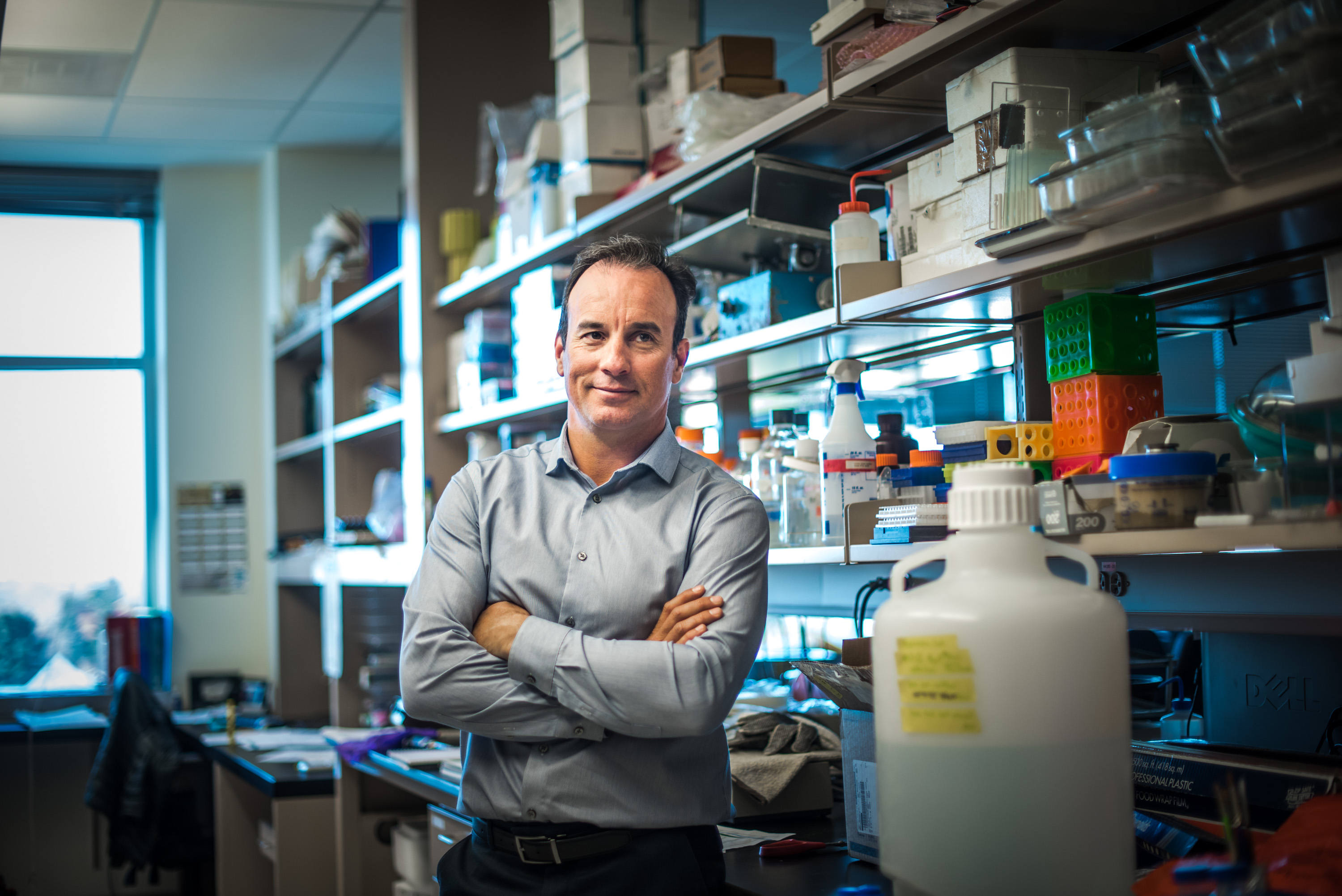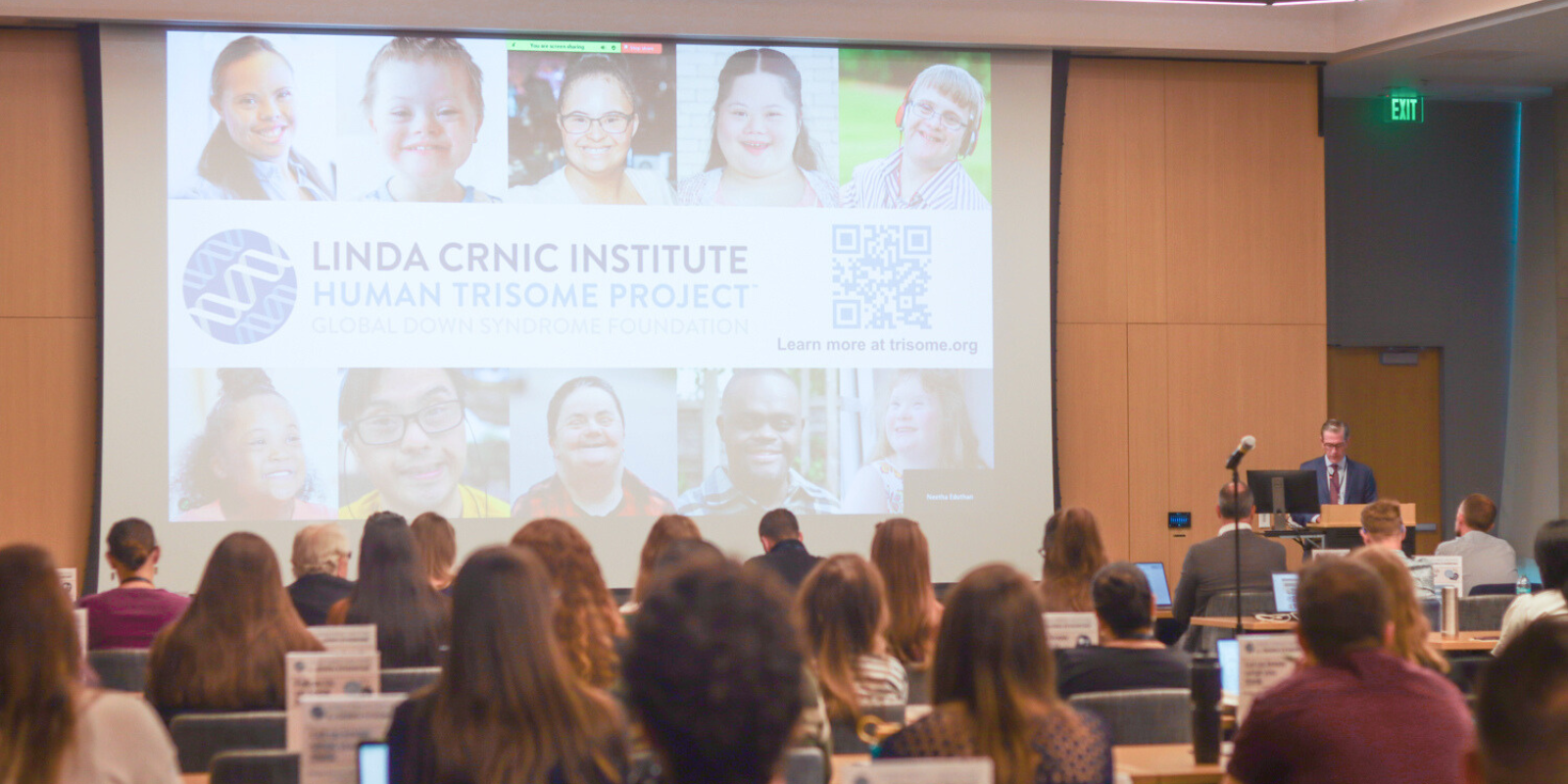On January 18, 2024, the Global Down Syndrome Foundation (GLOBAL) announced that Dr. Joaquín Espinosa, leader of its Affiliate, the Linda Crnic Institute for Down Syndrome (Crnic Institute) at the University of Colorado Anschutz Medical Campus, was awarded an Anschutz Acceleration Initiative (AAI) grant that will fund a pioneering clinical trial aimed at normalizing the immune system and decreasing inflammation in children with Down syndrome.
The award will fund the clinical trial proposal, “Immunomodulatory Therapy in Down Syndrome,” led by Espinosa and his team at the Crnic Institute, building on their groundbreaking discovery in 2016 that interferon signaling does not shut down in people with Down syndrome as it should, and the health consequences of that are multifold. That discovery was made possible through the establishment of the biorepository and database called the Crnic Institute Human Trisome ProjectTM that was funded in 2013 by the University of Colorado School of Medicine (CU SOM) on the Anschutz Medical Campus (CU Anschutz), the Anna & John J. Sie Foundation, and the Global Down Syndrome Foundation (GLOBAL).
“Receiving this grant is deeply gratifying,” says Dr. Joaquín Espinosa, Professor in Pharmacology and Executive Director of the Crnic Institute. “Everyone at the Crnic Institute, GLOBAL and all our Affiliates have worked so hard in the last ten years to take our remarkable findings from the Petri dish and parlay that into benefit for people with Down syndrome. This generous funding for a clinical trial grant from The Anschutz Foundation, CU Anschutz and the CU SOM could very well lead to a new age of therapeutic development to improve the quality of life and extend lifespan for millions of individuals with Down syndrome.”
“This project is an outstanding example of the leadership role academic medical centers provide in supporting fundamental research, developing discoveries into treatments, and moving treatments into clinical care,” said John J. Reilly, Jr., MD, Dean of the University of Colorado School of Medicine. “I am hopeful that this trial will provide a new therapy for individuals with Down syndrome that will improve their quality of life.”
“GLOBAL looks forward to helping Dr. Espinosa and his team raise additional funds for this transformative clinical trial grant and to providing outreach to our families,” says Michelle Sie Whitten, president & CEO of GLOBAL. “It truly does take a village and we simply could not do this without our amazing self-advocates, families, scientists, philanthropists like the Anschutz family, and of course our Congressional and NIH Champions.”
Down syndrome is a genetic condition where someone is born with three copies of chromosome 21 instead of two. It is often referred to as trisomy 21 (T21) and it is the most common chromosomal abnormality and a leading cause of intellectual and developmental disability worldwide.
The clinical trial funded by the AAI award will pave the way for the first immunomodulatory therapy for children with Down syndrome using a class of medicines known as JAK inhibitors. Key outstanding questions specific to individuals with Down syndrome will be addressed:
- What are the impacts of interferon hyperactivity during early childhood?
- How early during childhood could JAK inhibition be safely administered for therapeutic benefit?
- What are the long-term effects of JAK inhibition?
While a year of testing safety for the drugs in children participants is the first step, assuming positive results, this could launch a new age of therapeutic development to improve the quality of life and extend the lifespan of millions of individuals affected by T21. These efforts also position the University of Colorado Anschutz Medical Campus at the forefront of a burgeoning field of therapeutic development for complex genetic pediatric conditions.
The AAI was created with a $50 million gift from The Anschutz Foundation to rapidly advance medical treatments and health innovations to make a transformational impact on patient care. Established at the CU SOM, CU Anschutz Chancellor Don Elliman and Dean of the CU SOM John J. Reilly, Jr., MD, announced the grantees late last week. From over 165 letters of intent and ultimately 56 full proposals, 9 research projects were funded.
Dr. Espinosa is the Primary Investigator for the grant, and he has brought together a stellar team of professionals who have been participating in the Crnic Institute Down Syndrome Grand Challenge Grants and the Down Syndrome Super Group for years. They include: Robert C. Fuhlbrigge, MD, PhD, Professor, Pediatric Rheumatology; Jessica Bloom, MD, MSCS, Assistant Professor, Pediatric Rheumatology; Gabriel Tarshish, MD, Assistant Professor, Pediatric Rheumatology; Deborah Fidler, PhD, Professor, Human Development and Family Studies, Colorado State University; Lina Ramesh Patel, PsyD, Associate Professor, Psychiatry; Ryan Kammeyer, MD, MSE, Assistant Professor, Pediatrics and Neurology; Angela Rachubinski, PhD, Assistant Research Professor, Developmental Pediatrics; Kelly Sullivan, PhD, Assistant Professor, Pediatrics; Matthew Galbraith, PhD, Assistant Research Professor, Pharmacology.
The eight other AAI grants were awarded to:
-
Implementation of Personalized Skin Cancer Screening: Using Genetic & Clinical Risk Factors to Identify a High-Risk Subgroup
-
Making Personalization the Standard Through Rapid Design, Implementation, Testing and Maintenance
-
Multimaterial 3D Print Processing of Antimicrobial and Antifungal Dental Prosthetics
-
MyD88 Platform for Enhancing Cellular Cancer Immunotherapy
-
Oculomics as a Biomarker for Comprehensive and Non-Invasive Patient Health Assessment
-
Retinal Transplant to Restore Vision in Patients with Macular Degeneration
-
Targeting Protein Translation Elongation to Treat Cancer Patients
-
Transforming Gastrointestinal Cancer Care from Inpatient Surgery to Outpatient Endoscopy by Enabling Third Space Endoscopy



